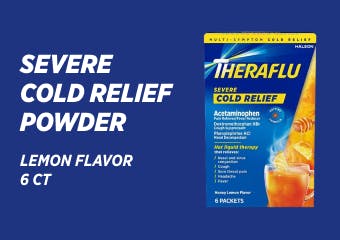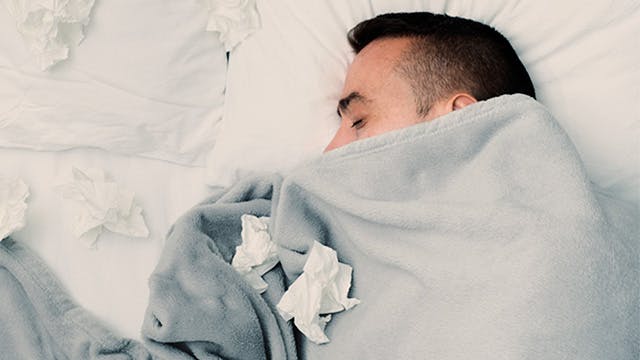How Do You Know if You Have the Flu?
The flu is an illness that is caused by the influenza virus.1 You are most likely to catch the flu during flu season, which typically occurs in the winter months.1 Some common flu symptoms include fever, chills, body aches, coughing, headache, sore throat and congestion.1 Children are more likely to experience additional symptoms like vomiting and diarrhea.1
How Can You Tell if You Have a Cold or the Flu?
In short, the flu is more severe than a cold. Although the symptoms of the two conditions are similar, cold symptoms are usually milder and don’t typically lead to complications.2 Some common symptoms that are more associated with the flu include fever, body aches, fatigue, chills and headache.1 Since cold and flu symptoms can be very similar, you can also take special tests to determine if you are sick with the flu.2
Although the flu is very common, it is more likely that you have a cold if you are feeling sick.3 Most people catch colds multiple times a year and only get the flu once every few years.3
Cold vs. Flu Symptom Onset
Another way to tell if you have a cold or the flu is by paying attention to how quickly your symptoms hit you. Cold symptoms tend to have a gradual onset, while flu symptoms typically come on abruptly.2 If you come in contact with the influenza virus, you can start to feel sick after one to four days.1 Mild cold symptoms can also start within a day after infection, but the worst of symptoms will likely peak after four to seven days.4
The Importance of Detecting Early Flu Symptoms
The flu comes on suddenly, and there are a number of symptoms that occur immediately after infection. Some of the symptoms you may experience early on include fever, body aches, headache, sore throat, coughing and headaches.4 Because it can lead to complications, recognizing the first signs of the flu is important for minimizing the chances of infecting people who are at more at-risk for severe illness from the flu.1,5 People who have weakened immune systems, chronic lung disease, blood disorders or are over 65 years old are among the several groups of people who are at-risk for developing complications.1
How to Detect and Treat Early Flu Symptoms
While most cases of the flu do not require a visit to a health care provider’s office, people who are at-risk for flu complications or have severe cases of the flu should schedule an appointment to find treatment options.3 The best way to get a flu diagnosis is to get tested by your health care provider.3 When testing for the flu, your health care provider will swab your nose or throat and use the results to prescribe the best treatment options.3 Severe cases of the flu can be treated early by taking an antiviral medication within two days of symptoms.3
To manage flu symptoms from home, get plenty of rest and drink lots of fluids to prevent dehydration.1 Taking over-the-counter medications for fever and congestion relief can help with the recovery process as well. Theraflu Flu Relief products can provide long-lasting flu symptom relief at any time. Get up to 6 hours of powerful relief from fever, nasal congestion, sinus pressure, cough, and other flu symptoms with Theraflu-D Flu Relief Max Strength + Nasal Decongestion syrup. Make a warm cup of Daytime Flu Relief Max Strength Hot Liquid Powder to keep symptoms at bay for up to six hours, and get the rest you need for recovery with Nighttime Flu Relief Max Strength Hot Liquid Powder. You can also get the Day/Night Hot Liquid Value Pack, Caplet Value Pack or the Syrup Value Pack to find relief at all hours.
Flu symptoms come on fast, and over-the-counter medications like Theraflu can help you manage them. Visit the Theraflu Health Hub to find more articles on dealing with a cold or the flu.





